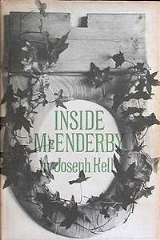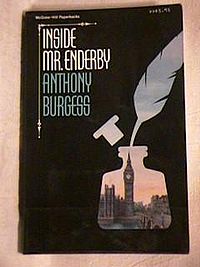
Inside Mr. Enderby
Encyclopedia
Inside Mr Enderby is the first volume of the Enderby series, a quartet of comic novels by the British author Anthony Burgess
.
The book was first published in 1963 in London
by William Heinemann
under the pseudonym Joseph Kell. The series which began with the publication, in 1963, of Inside Mr. Enderby, concluded in 1984 with Enderby's Dark Lady, or No End to Enderby
(after a ten year break following the publication of the third novel in the series, The Clockwork Testament, or Enderby's End
).
poet Francis Xavier Enderby while he is asleep. Enderby, a lapsed Catholic
in his mid-40's, lives alone in Brighton
as a 'professional' poet - his income being interest from investments left to him by his stepmother.
Enderby composes his poetry whilst seated on the toilet. His bathtub, which serves as a filing cabinet, is almost full of the mingled paper and food scraps that represent his efforts. Although he is recognised as a minor poet with several published works (and is even awarded a small prize, the 'Goodby Gold Medal', which he refuses), he has yet to be anthologised.
He is persuaded to leave his lonely but poetically fruitful bachelor life by the editor of a woman's magazine, Vesta Bainbridge, after he accidentally sends her a love poem instead of a complaint about a recipe in her magazine. The marriage, which soon ends, costs Enderby dearly, alienating him from his muse
and depriving him of his financial independence.
Months pass, and Enderby is able to write only one more poem. After spending what remains of his capital, he attempts suicide with an overdose of aspirin, experiencing disgusting (and rather funny) visions of his stepmother as he nears death. His cries of horror bring help, and he regains consciousness in a mental institution, where the doctors persuade him to renounce his old, "immature" poetry-writing self. Rechristened "Piggy Hogg", he looks forward contentedly to a new career as a bartender.
 Anthony Burgess wrote a review of Joseph Kell's book for the Yorkshire Post. "[W]hen the editor sent him the author's novel - Burgess thought it was a practical joke but it wasn't."
Anthony Burgess wrote a review of Joseph Kell's book for the Yorkshire Post. "[W]hen the editor sent him the author's novel - Burgess thought it was a practical joke but it wasn't."
When the paper found out that Kell was one of Burgess's pen names, Burgess was removed from his reviewing duties.
Anatole Broyard of The New York Times wrote:
Anthony Burgess
John Burgess Wilson – who published under the pen name Anthony Burgess – was an English author, poet, playwright, composer, linguist, translator and critic. The dystopian satire A Clockwork Orange is Burgess's most famous novel, though he dismissed it as one of his lesser works...
.
The book was first published in 1963 in London
London
London is the capital city of :England and the :United Kingdom, the largest metropolitan area in the United Kingdom, and the largest urban zone in the European Union by most measures. Located on the River Thames, London has been a major settlement for two millennia, its history going back to its...
by William Heinemann
Heinemann (book publisher)
Heinemann is a UK publishing house founded by William Heinemann in Covent Garden, London in 1890. On William Heinemann's death in 1920 a majority stake was purchased by U.S. publisher Doubleday. It was later acquired by commemorate Thomas Tilling in 1961...
under the pseudonym Joseph Kell. The series which began with the publication, in 1963, of Inside Mr. Enderby, concluded in 1984 with Enderby's Dark Lady, or No End to Enderby
Enderby's Dark Lady, or No End to Enderby
Enderby's Dark Lady, or, No End to Enderby is a 1984 novel by Anthony Burgess, the final volume in the Enderby series.The character was killed off in the third book, The Clockwork Testament, or Enderby's End , but Burgess later considered this a mistake and brought the character back for one more...
(after a ten year break following the publication of the third novel in the series, The Clockwork Testament, or Enderby's End
The Clockwork Testament, or Enderby's End
The Clockwork Testament is a novella by the British author Anthony Burgess. It is the third of Burgess' four Enderby novels and was first published in 1974 by Hart-Davis, MacGibbon Publishers. It is usually subtitled Enderby's End, as it was originally intended to be the last book in the Enderby...
).
Plot summary
The story opens on a note of pure fantasy, showing school children from the future taking a field trip through time to see the dyspepticDyspepsia
Dyspepsia , also known as upset stomach or indigestion, refers to a condition of impaired digestion. It is a medical condition characterized by chronic or recurrent pain in the upper abdomen, upper abdominal fullness and feeling full earlier than expected when eating...
poet Francis Xavier Enderby while he is asleep. Enderby, a lapsed Catholic
Catholic
The word catholic comes from the Greek phrase , meaning "on the whole," "according to the whole" or "in general", and is a combination of the Greek words meaning "about" and meaning "whole"...
in his mid-40's, lives alone in Brighton
Brighton
Brighton is the major part of the city of Brighton and Hove in East Sussex, England on the south coast of Great Britain...
as a 'professional' poet - his income being interest from investments left to him by his stepmother.
Enderby composes his poetry whilst seated on the toilet. His bathtub, which serves as a filing cabinet, is almost full of the mingled paper and food scraps that represent his efforts. Although he is recognised as a minor poet with several published works (and is even awarded a small prize, the 'Goodby Gold Medal', which he refuses), he has yet to be anthologised.
He is persuaded to leave his lonely but poetically fruitful bachelor life by the editor of a woman's magazine, Vesta Bainbridge, after he accidentally sends her a love poem instead of a complaint about a recipe in her magazine. The marriage, which soon ends, costs Enderby dearly, alienating him from his muse
Muse
The Muses in Greek mythology, poetry, and literature, are the goddesses who inspire the creation of literature and the arts. They were considered the source of the knowledge, related orally for centuries in the ancient culture, that was contained in poetic lyrics and myths...
and depriving him of his financial independence.
Months pass, and Enderby is able to write only one more poem. After spending what remains of his capital, he attempts suicide with an overdose of aspirin, experiencing disgusting (and rather funny) visions of his stepmother as he nears death. His cries of horror bring help, and he regains consciousness in a mental institution, where the doctors persuade him to renounce his old, "immature" poetry-writing self. Rechristened "Piggy Hogg", he looks forward contentedly to a new career as a bartender.
Criticism

When the paper found out that Kell was one of Burgess's pen names, Burgess was removed from his reviewing duties.
Anatole Broyard of The New York Times wrote:
"Mr. Burgess is so fond of Enderby - by far his best creation - that he has devoted four books to him: Inside Mr. Enderby and Enderby Outside, which were published in 1968, The Clockwork Testament in 1975, and now, Enderby's Dark Lady."
Release details
- 1963, UK, William Heinemann (ISBN B0000CLQ13), Pub Date ? ? 1970, Hardback
- 1984, US, Mcgraw-Hill (ISBN 0-07-008973-6), Pub Date April ? 1984, Hardback
- 1984, US, Mcgraw-Hill (ISBN 0-07-008970-1), Pub Date ? ? 1984, Paperback
- 1996, US, Carroll & Graf Publishers (ISBN 0-7867-0248-6), Pub Date January ? 1996, Hardback (complete Enderby series)

